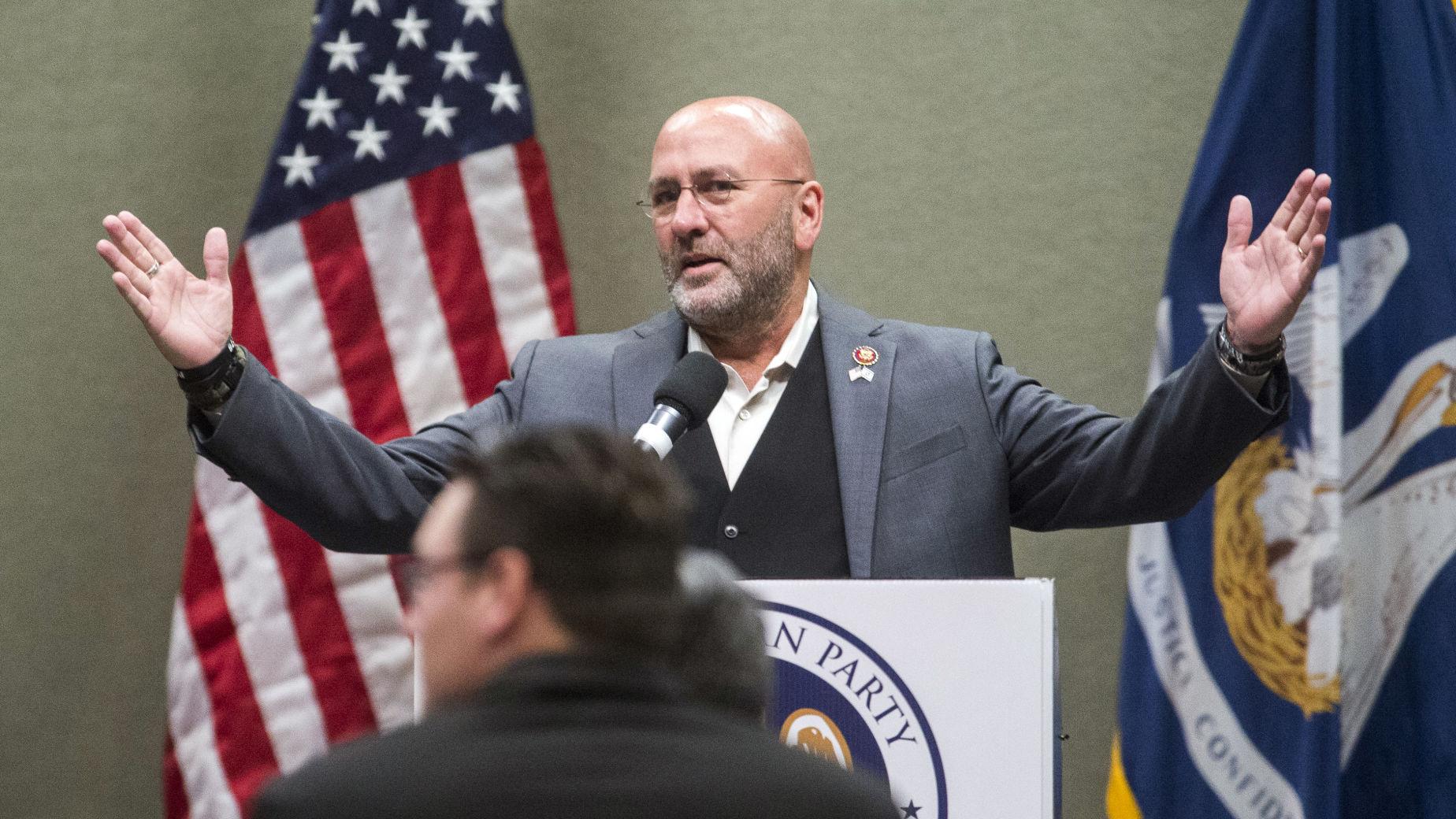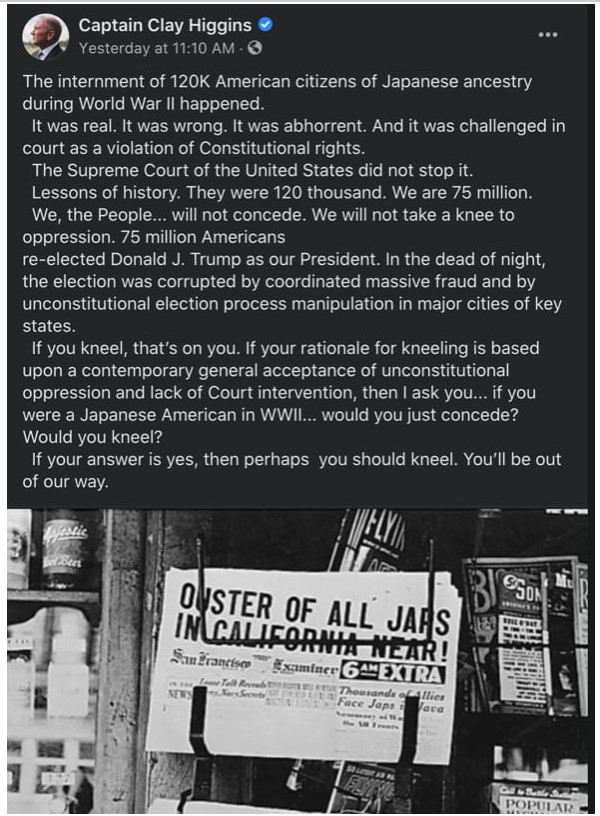December 17, 2020
Last week, Louisiana congressman Clay Higgins upped the ante on GOP claims that the recent presidential election was “stolen” by voter fraud, going so far as to compare it to Japanese American incarceration during WWII. “They were 120 thousand. We are 75 million,” he wrote on Facebook, before going on to promise—or, depending on your vantage point, threaten, “We, the People… will not concede. We will not take a knee to oppression.”
It’s a now-familiar page in the white nationalist playbook: Co-opt someone else’s historical traumas because you lack any lived experience of marginalization of your own, claim that not getting your way is the same kind of “oppression,” rinse, repeat. But what’s fresh and new and especially repugnant about Rep. Higgins’ statement is his victim-blaming implication that Japanese Americans were incarcerated because they didn’t stand up for themselves—rather than, you know, racism.
“If you kneel [to this imaginary election fraud], that’s on you. If your rationale for kneeling is based upon a contemporary general acceptance of unconstitutional oppression and lack of Court intervention, then I ask you… if you were a Japanese American in WWII… would you just concede? Would you kneel? If your answer is yes, then perhaps you should kneel. You’ll be out of our way.”
There’s a lot to unpack in this hot garbage take, but let’s be clear. Japanese Americans did not “kneel” during WWII. Many actively resisted the forced removal and incarceration. There were draft resisters who refused to fight for a country that put their families in government-run concentration camps. Labor strikes in almost every War Relocation Authority camp, and uprisings at Santa Anita, Manzanar, Poston, and Tule Lake. Legal challenges by Fred Korematsu, Gordon Hirabayashi, Minoru Yasui, Mitsuye Endo, Lincoln Kanai, Mary Asaba Ventura, Ernest Kinzo and Toki Wakayama. And many smaller acts of subversion and resistance by others less widely sung.
But even for the majority of Japanese Americans who did not participate in active, outwardly visible resistance, it’s a gross oversimplification to look at a group of people doing what they needed to do to survive and dismiss their resilience in the face of state violence as simply “conceding” to oppression.
Japanese Americans were forced out of their homes and transported to prison camps where they were held under armed guard and threatened with death if they attempted to leave without authorization. Clay Higgins is mad because he voted for a presidential candidate who lost. No one is disappearing his supporters from their communities or imprisoning them for who they are or what they believe—and to pretend otherwise is a self-serving lie.
If Higgins and his ilk really cared about standing up to government oppression, they would be fighting to stop the disenfranchisement of Black and brown voters, to #CloseTheCamps and deconstruct the prison-industrial complex, to put an end to the violent suppression of protests against police brutality in cities across the country. But the truth is that people like Higgins are perfectly comfortable with oppression when it benefits them.
So no, our Japanese American elders didn’t kneel during WWII, and we’re not kneeling now. We have no intention of getting out of the way. And for those of us who’ve actually learned from our history and can recognize a real injustice when we see one, here are a few actions we can all take to obstruct the Clay Higgins of the world:
Stand up to actual voter suppression.
Higgins’ claims of voter fraud may be made up, but attempts to keep Black and brown voters away from the polls are very real. In Georgia, where two runoff elections in January will determine which party takes control of the Senate, nearly 200,000 voters were illegally purged from voting rolls over the last two years, and many polling stations in majority POC districts were closed during the 2020 election. As Georgians begin early voting in the January election — which is itself the product of a 1960s law to preserve white political power and restrict Black voters — on-the-ground organizers are working to ensure that every vote is counted.
Donate to the Georgia Fund if you can to support local groups fighting voter suppression, and get involved in other local efforts like the WA Voting Justice Coalition’s #RestoreTheVote campaign.
Take action to #DefendBlackLives.
Read Sara Onitsuka’s breakdown of why Japanese Americans should join the fight for abolition, and learn more about what abolition means and how organizers propose we get there at 8toabolition.com.
Download the Movement for Black Lives’ #ReparationsNow toolkit to learn about the long history of struggles for reparations for Black people, and how you can support Black organizers who are continuing that struggle today.
Make time and seek out educational resources to have difficult conversations with peers and loved ones about anti-Blackness and what we can do to dismantle it. Here are a few to start with:
- Letters for Black Lives
- Call on Me, Not the Cops (18 Million Rising)
- Black and Asian American Feminist Solidarities: A Reading List
Join the call to #FreeThemAll.
Given the inability (and unwillingness) of ICE, the Department of Corrections, and private prison profiteers like GEO Group to protect incarcerated people from COVID-19, many are calling for prisons and immigrant detention centers to be closed. Learn more about the conditions incarcerated people are facing and how you can help from groups like Detention Watch Network, La Resistencia, California Coalition for Women Prisoners, and the Asian Prisoner Support Committee. (And read Natasha Varner’s piece on epidemics in camp to understand the historical connections to Japanese American WWII incarceration.)
Donate money, supplies, or time to local mutual aid networks.
Mutual aid pools a community’s resources together to provide collective care and empower those who are doing urgent frontline work but often don’t have access to government grants or nonprofit funds to support that work. Find a mutual aid collective near you.
—
By Nina Wallace, Densho Communications Coordinator
[Header photo: Congressman Clay Higgins speaks during a Republican rally Monday, October 7, 2019, at the Cajundome Convention Center in Lafayette. Leslie Westbrook / The Advocate.]

